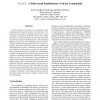Free Online Productivity Tools
i2Speak
i2Symbol
i2OCR
iTex2Img
iWeb2Print
iWeb2Shot
i2Type
iPdf2Split
iPdf2Merge
i2Bopomofo
i2Arabic
i2Style
i2Image
i2PDF
iLatex2Rtf
Sci2ools
127
click to vote
ACSAC
2004
IEEE
2004
IEEE
PEACE: A Policy-Based Establishment of Ad-hoc Communities
Ad-hoc networks are perceived as communities of autonomous devices that interconnect with each other. Typically, they have dynamic topologies and cannot rely on a continuous connection to the Internet. Users' devices often do not have a priori knowledge of each other and cannot rely upon pre-existing shared information. This introduces difficult security issues when attempting to provide authentication, membership management and access control. Designing a framework which allows the secure establishment and management of ad-hoc communities remains a significant challenge. In this paper, we propose a novel policybased security framework to facilitate the establishment, evolution and management of mobile ad-hoc networks. We introduce a community specification, called doctrine, which defines the roles of the participants in the community, the characteristics that participants must exhibit in order to be eligible to play a role, as well as the policies governing their behaviour withi...
ACSAC 2004 | Ad-Hoc Networks | Difficult Security Issues | Pre-existing Shared Information | Security Privacy |
| Added | 20 Aug 2010 |
| Updated | 20 Aug 2010 |
| Type | Conference |
| Year | 2004 |
| Where | ACSAC |
| Authors | Sye Loong Keoh, Emil Lupu, Morris Sloman |
Comments (0)

